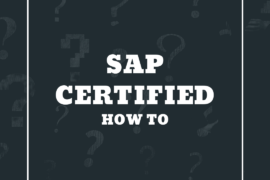Introduction
Throughout my career, one of the questions I heard most from people on projects or even from friends, was “How do I become an SAP consultant?”
I confess that 100% of the times I listened, I didn’t have a ready answer to give.
And why is that?
Because SAP is a little different from the others, especially when compared to other sectors within the technology industry.
When I say differently, it is because depending on the module you choose to work on (I will talk about it later), you may have more facilities or difficulties to get work.
Below, I will list the main points and give some tips to anyone who wants to become an SAP consultant.
1) Choose between a technical or functional module
SAP is an extremely complex and complete system.
Because of this, to be implemented correctly, the most diverse professional profiles are needed.
In another post, I will explain which are the main modules that are part of SAP, but for now, I will try to divide the SAP world only into “technical” or “functional”.
Functional Module
When we talk about SAP functional consultants, we are talking about consultants who work by understanding the business processes of the company in which the project is being implemented and “convert” them into processes within the SAP system.
What do I mean by conversion?
Conversion is nothing more than transforming those day-to-day business processes into functional processes within the SAP system.
Of course, it is not a simple task, because SAP has its way of dealing with processes and what usually happens is an adaptation.
In many companies that go through SAP projects, after their implementation, the processes end up changing (sometimes even quite), which can cause a certain initial awkwardness on the part of the users of the system (something normal).
Therefore, when deciding to become a functional consultant, it is important that you know (or want to understand) in depth a certain business area (such as Supply chain, Accounting, Costs, Distribution, etc.) to go deeper into the processes and help the company to have the best possible process configured in SAP.
In addition to the processes, you will also act in more technical activities, such as data migration, creation of functional specifications (requirements for changes in the system where the help of a technical consultant is needed – we will talk more soon), etc.
And to complete, acting as a functional consultant, you will use communication a lot. You will participate in several meetings, write process flows, speak with different users of the company, etc. (In my professional experience, I can say with all certainty that communication is the main key to a successful project).
Technical Module
Now, if you have a more technical profile (especially if you already work in the technology area as a programmer or some similar activity), you may be better suited to the more technical part of SAP.
In all projects, the ABAP programmer is extremely necessary, because even though SAP is an incredible and complete system, there is always a need for a new program so that any specific requirement of the company is met by the system.
In this case, the functional consultant performs the entire survey of the application, creates a functional specification (standard in all projects), and explains to the ABAP consultant what needs to be done.
So the ABAP consultant creates the program (a communication between the functional consultant and the ABAP consultant is extremely important for the correct development of the program), performs the initial tests and after completing it, asks the functional consultant to perform more tests for consider delivery and release for testing by the end-user.
As it is a more technical position, the ABAP consultant does not need to interact so much with the end customer (usually the functional consultant does this interaction), but he usually works serving all the project consultants on the most diverse fronts (being an extremely requested professional and always present in all project teams).
I would like to mention that I spoke only of the ABAP Consultant as a technical consultant, but we have several other technical consultants within an SAP project (we will talk in other posts about it).
2) Choose SAP Module
After deciding whether you want to be a Functional consultant or a Technical consultant, you need to define which module you will act on.
It is not a very simple task to make that decision.
In my opinion, many factors must be taken into account, because the module in which you have more affinity is not always the module where you find the most opportunities.
An important point is to read about each module and decide which ones you have the most affinity with.
After creating the list, talk to some people who are already in the SAP area (a tip is to talk to an experienced project manager so that you will have the vision of a person who deals with all types of consultants) to understand which of those modules has more demand for projects/work.
With that answer in mind, you can now choose your possible module.
3) Modules with more projects
You may be wondering, but aren’t there some basic modules that are important and are present in every project?
Yes, they exist.
Virtually all companies need to buy and sell, so in almost all projects we have the SD (Sales) and MM (Purchasing) modules present.
And of course, we need to have everything accounted for (FI) and funded (CO), to have real control of the entire operation.
These four modules are usually present.
Besides, it has an important point that changes a lot according to the country.
When we talk about countries where tax legislation is extremely complex, SAP develops a series of additional solutions that are called “Localization” to meet the diverse tax and legal requirements of that particular country.
In this case, the most affected modules are SD, MM, and FI, which makes these professionals even more important (since foreign professionals are unlikely to have this specific knowledge), making them essential in global (very common) projects.
You may also be wondering, but do I need all the modules to implement SAP?
Of course not!
Each company has a business profile and, therefore, only implements the modules necessary for its operation. For example, if a company only imports materials and distributes them, it does not need the PP (Production) module, as it does not have any productive activity within the company.
4) Processes
If you choose to become a functional consultant, I advise you to thoroughly study the processes that are within the chosen module.
It is very common for technology professionals (as was my case) to conduct an SAP academy without the slightest knowledge of the process and go directly to SAP implementation projects.
Not that it is wrong, but the difficulty you face in this type of situation is tremendous because when the project starts, the client expects you to have a good base of processes so that together they can define the best possible solution for a given process. And if you don’t have a clue about the process, a lot of time will be wasted.
I recommend that you study in parallel with SAP knowledge, ALL the processes in your area of expertise because then, you will surely have a much smoother day.
5) SAP Academy (Do it)
An SAP Academy is not cheap, but it is necessary.
When conducting an SAP academy, you will not leave a complete professional, but just like an undergraduate course, you will receive the “base” knowledge, so that, from there, you can study more, work, gain experience and put all that basis in practice.
It is not easy to choose a location for the SAP academy (the official SAP academies are great and you can check the values directly on the official SAP education website http://training.sap.com), but you can also talk to people who already act as consultants and ask for referrals from other institutions where you can acquire this knowledge.
The important thing is to make sure you have an academy where you can see the chosen module as a whole.
6) Country Localization
As I said earlier, some modules (mainly SD, MM, and FI) are strongly impacted in countries where tax laws are constantly being modified (Brazil for example).
In this case, the consultants of the modules mentioned above must have a good base in the tax part so that they can meet the legal requirements that will be requested by the client in question.
An important tip is to take tax courses to create a good knowledge base.
Recalling that, in most countries, the purchase tax (MM) and sales (SD) settings are made by the finance consultant (FI), but in Brazil, these settings are always made by the SD and MM consultants.
7) Languages
SAP is a German company that is present in most countries in the world.
Therefore, it is extremely common for most projects to have people from other countries working.
In a good part of the cases, English will be important, so I would say, that speaking English in this basic area (or you will lose out as the best job opportunities, the choice is yours).
But depending on where you are located, other languages maybe even more important than English (like Spanish, German, French, etc.).
My opinion is that you never stop studying languages, the more you speak, the greater your value in the market, and the more job opportunities you will receive.
8) Never stop studying
I know several professionals who, upon reaching the position of Senior Consultants, simply stopped studying and evolving.
They say they already know a good part of their module and have more need to study.
They have a good income and are calm.
Here enter the point of how far you want to go.
If you’re okay like that, OK.
But one of the big problems, when you settle for the point, is that you start to complain about the area.
Common complaints are: I am discouraged with SAP, I want to change areas, I am sick of that area, etc.
People start to complain a lot and do not realize when the human being stops learning, the person simply loses that sparkle in his eyes, and his life becomes “boring.
I recommend that you simply NEVER stop studying.
In addition to SAP being a huge world, the company is extremely innovative and is always creating new modules and solutions.
Learn a new module, get updated, study, study, and study!
9) Start your career in a big consulting firm
I want to make a suggestion that I didn’t follow and I regret it a lot.
I have always been a very dedicated person who wanted everything very quickly.
My initial motivation for the SAP world was financial. I am not ashamed to admit it.
So much so that I never worked directly for a consultancy. I have always been autonomous in this area.
On the bright side, I always had an independent career (we will have a post about being self-employed or hired), but on the other hand, I missed the opportunity to have supported early in my career.
So I want to suggest that you look for a great consultancy to start your career as a junior and from then on really start to walk your professional path.
And why do I say that?
Because you will have more support (not 100%), you will experience several different business segments (which is incredible) and you will learn a lot from more senior professionals.
Unfortunately, the bad part of this strategy is that your monthly income will be less than if you were self-employed, but in the long run, this strategy will be worth it.
10)Finally: The First Job
And after going through so many points and reading this whole post, you must be asking yourself: If I follow everything that has been said here, how do I get my first job?
I suggest that you get in touch with the biggest consultants that work with SAP and ask about the positions for new consultants (some consultants offer the SAP academy free of charge), and if you don’t find an opportunity, contact the medium/small companies and try the same strategy.
If you are participating in an SAP project (but as a customer), make a good relationship with the consulting team and try to negotiate a possible position as a consultant after the end of the project (it is a great strategy).
The first position as an SAP consultant is not easy.
In my case, the factor that weighed most at the time was my second language. (It is a great differential as I mentioned above).
The more prepared you are and the more persistent you are, the easier it will be for you to enter the market.
All the effort will be worth it! The SAP world is incredible. I assure you!
Conclusion
The idea of this post was to give simple yet very powerful tips for professionals who are planning to enter the SAP career.
I would have loved to read a post like that 10 years ago.
If you liked this post, be sure to subscribe to our newsletter to receive first hand the next posts and share this post with your friends.
If you have any suggestions (including subjects you would like to read about), feel free to send an email to sapsteps@sapsteps.com.
A big hug,
Bruno César



